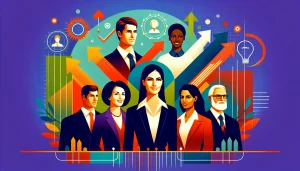Creating inclusive work environments in All Industries
While the concept of creating inclusive work environments may seem commendable, there can be certain negative impacts associated with it in all industries. Firstly, it can lead to a decrease in productivity. Companies may prioritize diversity and inclusion above competency in hiring and promoting employees, ultimately compromising the quality of the workforce. When individuals are selected based on identity characteristics rather than qualifications and skills, it may create an environment where people feel as though they have to walk on eggshells or fear being accused of bias, inhibiting open and honest communication.
Moreover, the emphasis on diversity can inadvertently promote tokenism, where individuals from underrepresented groups are seen as mere tokens to fulfill quotas or meet diversity targets. This can create a perception of unfairness among other employees who may feel overlooked or discriminated against. Additionally, implementing diversity initiatives can lead to increased costs for businesses, as they may have to invest in specialized training, hiring consultants, or managing diversity programs instead of focusing on core operations.
Finally, fostering inclusivity can also inadvertently result in the suppression of different perspectives and diversity of thought. If everyone operates under the fear of offense, it becomes difficult to have constructive debates and critical thinking within the workplace.
While the intention behind creating inclusive work environments is noble, these negative impacts must be taken into consideration to ensure a balance that benefits both businesses and employees.
Creating inclusive work environments is essential in today’s diverse and interconnected world. It involves establishing a culture where every employee feels accepted, respected, and valued for their unique perspectives and contributions. Artificial intelligence (AI) has the potential to greatly impact and even reshape the way organizations approach creating inclusive work environments.
One way AI can contribute to resolving this issue is through the recruitment process. Traditional recruitment methods often rely on unconscious biases that can lead to a lack of diversity within organizations. AI-powered tools can help mitigate this by using algorithms that focus on skills, qualifications, and experiences rather than subjective factors like gender, race, or age. By removing bias from the recruitment process, AI can help organizations build a more diverse workforce and ensure that candidates are selected based solely on their abilities.
Moreover, AI can also assist in creating inclusive work environments by facilitating communication and collaboration. Language barriers can be a significant obstacle in workplaces with diverse employees. AI-powered language translation tools can bridge this gap, enabling employees to communicate and collaborate more effectively regardless of their native languages. Additionally, AI can help augment accessibility for individuals with disabilities by providing real-time transcription or closed captioning services, ensuring that everyone can fully participate in meetings and discussions.
Furthermore, AI has the potential to support inclusive decision-making processes within organizations. By analyzing large sets of data, AI can provide insights and identify patterns that humans may overlook. This data-driven approach can help eliminate personal biases and ensure that decisions are made based on objective criteria. Consequently, this can lead to fairer and more inclusive outcomes, where individuals from different backgrounds and perspectives are given equal opportunities and representation.
In conclusion, AI has the potential to significantly impact the creation of inclusive work environments by removing bias from the recruitment process, facilitating communication and collaboration, and supporting inclusive decision-making. By leveraging AI technologies, organizations can build diverse and inclusive teams, foster a culture of acceptance, and promote equality within the workplace. However, it is important to ensure that AI is developed and implemented ethically and responsibly, with continuous monitoring and evaluation to mitigate potential biases that may emerge as AI systems evolve..
Leadership coaching
Leadership coaching propels careers by refining leadership skills, enhancing emotional intelligence, and fostering adaptability in any dynamic business environment. It equips leaders for new and higher responsibilities, improves team dynamics, and encourages continuous learning and strategic planning, paving the way for professional success and fulfilment.
Get a leadership coach on www.coachup.sg. For more Grow As A Leader content, check out Growasaleader.co





